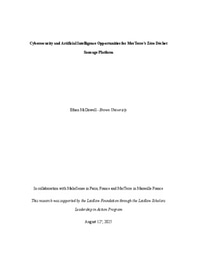Week 5: Finalization of Deliverables
Week 5: Bringing It All Together
Week five of my Central LiA Project with MakeSense and MerTerre was about focus and finalization. With our timeline moving toward the end of the Marseille phase, the week was structured around analyzing our fieldwork results, refining our strategies, and preparing to deliver a cohesive final report. The pace felt intentional; every meeting, coaching session, and conversation had a clear link to wrapping up our work in a way that would be actionable for MerTerre moving forward.
What went well?
We began the week with a session led by Jade on analyzing our field studies. This was the first time we sat down to look closely at the data collected in recent weeks, and it was rewarding to see the patterns emerging. Working alongside Jade helped connect the raw observations with the project’s larger objectives, especially in terms of identifying where interventions could have the most impact.
The week also included back-to-back coaching sessions with Emma and Jade at Les Jardins d’Haïti. Having these discussions outside of our usual workspace brought a fresh perspective; the setting encouraged more open brainstorming, and the conversations ranged from technical implementation to community engagement strategies. It was a reminder that sometimes a change of environment helps the ideas flow more freely.
What could have been done differently?
I think I could have done more to merge our fieldwork analysis with the legislative research earlier in the week. The two strands of work are deeply connected, and integrating them sooner would have allowed for more time to refine the recommendations in light of our real-world observations. Next time, I want to build in dedicated time blocks for explicitly linking datasets to policy frameworks as they develop.
What did I learn about myself when working with others?
This week reaffirmed that I work best when I can shift between analytical and collaborative modes. I enjoyed starting the day with focused individual work on the data and then moving into group discussions where those findings could be tested and expanded through others’ perspectives. I also found that I am increasingly comfortable voicing the technical implications of our ideas, which helps ensure that our proposals are both ambitious and realistic.
What did I learn about leadership?
Emma and Jade again demonstrated two complementary leadership styles, Emma’s ability to frame discussions in a way that keeps our long-term vision in sight, and Jade’s skill in steering conversations toward concrete next steps. Both emphasized the importance of clarity, especially at this stage in the project when small misunderstandings can snowball into missed opportunities. It reinforced for me that strong leadership in the final phases of a project means balancing momentum with precision.
What do I want to develop or focus on next?
Going forward, my focus is on ensuring that the final deliverables clearly reflect both the technical and policy-oriented dimensions of our work. I want to make sure that the systems we propose for data collection and visualization are not just functional, but also integrated with the legislative recommendations so they can directly support advocacy and decision-making.
Updates on Deliverables
This week was about moving from field observations to early analysis. Working with Jade on Monday, I began organizing the Le Frioul data into clearer categories so we can identify patterns more easily. I focused on making sure location information, waste types, and quantities were consistently recorded, which will help when we start visualizing results on the Zéro Déchet Sauvage platform. I also began outlining a simple structure for how future field data could be logged in a way that keeps it compatible with MerTerre’s existing systems.
I built a comparative matrix that scores France and the EU framework against Japan and Canada across six levers: EPR scope, deposit return coverage, litter enforcement, microplastic controls, municipal powers, and public data requirements. The gaps are clearest in national litter enforcement and uneven container return schemes. I drafted recommendations that extend EPR to fishing gear and tobacco filters, propose a national deposit return scheme that includes glass and aluminum, require standardized litter reporting that plugs into Zéro Déchet Sauvage, and enable administrative fines at the municipal level. I produced two concrete outputs for MerTerre: a three page brief that ties our findings to outcomes from the United Nations Ocean Conference in Nice and to the Geneva plastics treaty pillars on upstream reduction, design for reuse, and monitoring, and a set of one pagers on Japan’s Containers and Packaging Recycling Law and Canada’s federal single use plastics rules with provincial EPR and DRS examples. I connected the data and policy work by mapping our top five Le Frioul items to specific levers, for example cigarette filters to enforcement and bin placement, plastic bottles to deposit return, ropes and nets to gear EPR, and polystyrene to targeted bans.
Life in Marseille this week
Marseille in early August has a different rhythm. The mornings are slower, with the heat building quickly, and the afternoons feel almost suspended in the glare of summer. Traveling to Les Jardins d’Haïti for our coaching sessions took me through parts of the city I had not explored before, full of small markets and tree-lined streets. On Friday, I walked past the Old Port and noticed more sailboats than usual, their masts cutting into a deep blue sky.
Even in the final stretch of project work, the city remains a constant backdrop, its energy shaping our days as much as our schedules do. The mix of focused indoor sessions at La Bascule and brief escapes outside for a coffee or short walk kept me grounded. Marseille has a way of reminding me that the work we are doing is rooted in real places, real coastlines, and the communities that depend on them.



Please sign in
If you are a registered user on Laidlaw Scholars Network, please sign in